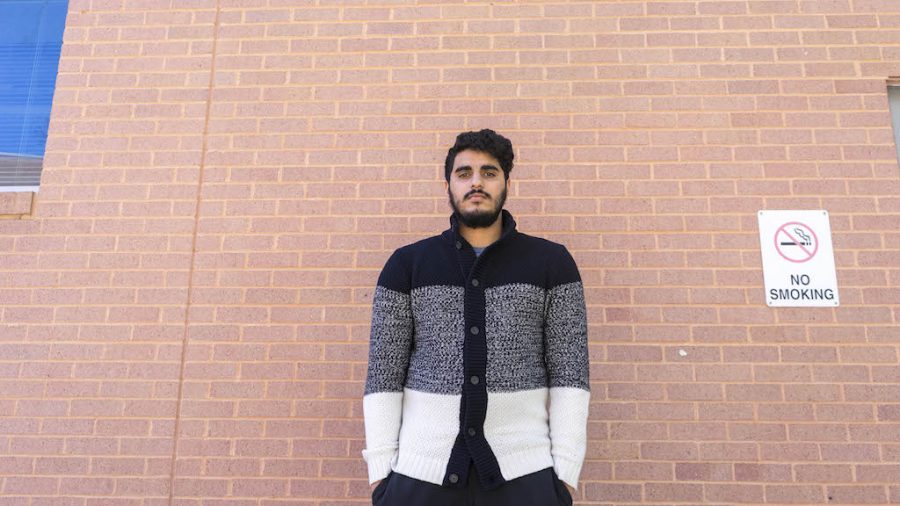Travel ban unpopular with Muslim students
180 international students are enrolled at AACC.
March 1, 2017
President Donald Trump’s efforts to limit immigration have upset AACC’s Muslim community.
One student called the president’s now-suspended executive order restricting travel from Muslim-majority countries “absurd.”
“The extent of who can’t return even with proper documents is absurd,” Samir Berraho, a Muslim sociology major, said. “Anyone with the proper documentation should be allowed to travel back and be accepted here.”
Trump issued an executive order on Jan. 27 to temporarily prevent citizens of seven Muslim countries from entering the U.S. After a federal judge temporarily suspended the order, and a U.S. Circuit Court of Appeals upheld the ruling, Trump announced he would issue a second executive order. Any new order is likely to face legal challenges as well.
AACC President Dawn Lindsay called on Muslim students and faculty to prepare for “continued periods of uncertainty.” In an email to faculty, Lindsay also reminded them that AACC holds the values of open-mindedness, equity and respect high.
Lindsay also advised community members who have family and friends in Iran, Iraq, Syria, Yemen, Somalia, Sudan and Libya–the seven countries in the order–to avoid traveling if they can, and to consult a travel attorney if they do.
Attorney Adil Qaiyumi, a professor in AACC’s Homeland Security and Criminal Justice Institute, received calls after the original order from clients who had family in the seven countries, asking if traveling is a good idea.
Qaiyumi personally had the same discussion with his Canadian-born wife, who took a trip to southeast Asia two days after Trump issued the executive order.
“We had that conversation [about traveling],” Qaiyumi told Campus Current. “[My wife is] a Canadian citizen, so things could change. So we asked ourselves should she still travel, and we decided yes [she should.]”
Dr. Dan Nataf, director of the Center for The Study of Local Issues, said Trump is acting too quickly.
“For Trump, it’s easy as throwing stuff up on the wall and seeing what sticks,” Nataf said. “It’s just his way. But obviously [the travel ban] didn’t come up as sound policy.”
Nataf said the wiser process for the Trump administration would be to consider each immigrant on a case-by-case basis rather than issue a blanket ban, which treats everyone as a threat.
“There are going to be people who are not jihadi,” Nataf said. “But everybody is treated the same [under a blanket ban,] no matter what you know about them.”
Nataf also said that while Trump’s presidential campaign included a promise to fight terrorism, those remarks had played on fear, and the travel ban was what he came up with.
“It was a longshot in the sense that the idea that the vetting [of immigrants] was so inadequate that it allowed someone [with bad intentions] in, to get a visa, and now they’re coming here, and they’re going to do nasty things once they get here,” Nataf said. “That scenario is a low-probability event. It is not a zero-probability event.”
Qaiyumi also said foreign students who are coming into the country seeking an education could be affected by any travel ban. While some students on campus have F1 visas, which allow international students to maintain a full course of study while in the country, some may not have been allowed back into the country in the days following the travel ban.
“No students in my classroom [were affected] and no one has made me aware of any,” Qaiyumi said, but added, “I’m sure there may be a few examples on campus.
Still, he said, the college could be affected by “the chilling effect [a travel ban] may have on international students who maybe want to apply to [AACC] … but they’re reluctant to do so now because they may fear they may not be able to come back or they may lose part of their tuition.”
Sahra Qaemi, another Muslim student on campus, said AACC should reach out to students to see what the college can do to help them. But she said the ban is unlikely to go any further.
“I think the ban will stop here,” Qaemi said. “Everyone as a society is not going to let [the ban] continue, because we will work together to keep it from moving forward.”
The Immigration and Nationality Act of 1952 gives the president the authority to suspend immigration of “any class of aliens” that he deems harmful to the United States. However, the act was modified in 1965 to prevent discrimination against an individual because of national origin.
The Trump administration argues that the ‘52 act still applies, according to Nataf, because it is not clear whether the president has the authority to stop immigration from a certain country.
Shane Dabolt, a second-year economics major, said the ban is a result of Trump’s political inexperience.
“It’s a 90-day ban from only seven countries,” Dabolt said. “It’s suitable for a new, incoming politician who is not used to being president.”
However, second-year transfer studies major Anthony Quagliato, argued that the travel ban is discriminating, regardless of Trump’s political experience.
“The travel ban is nationality discrimination, posed as an effort to secure the country,” Quagliato said. “But in actuality, it is a façade … the goal being to scare the people into [thinking immigrants] are terroris[ts].”
Like Qaiyumi, Homeland Security and Criminal Justice Institute professor Anika Ingram operates her own legal firm, and also received phone calls from clients about the travel ban.
The executive order does ban Muslim people, but because the countries in the ban are Muslim-majority, some label the travel ban as a “Muslim ban,” according to Ingram.
“A lot of times, we just live our lives because we’re happy, and don’t realize that so much is going on,” Ingram said. “I think we have to be more willingly aware and ready to engage and talk” about immigration.












